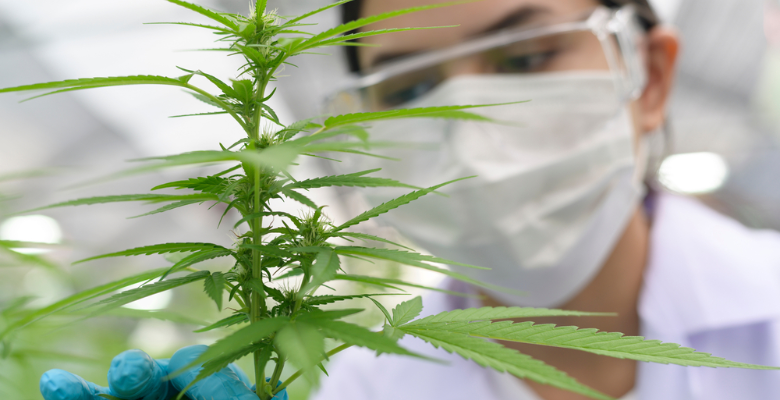One of the most common uses of medical cannabis is in the treatment of chronic painRheumatoid arthritis (RA) is an autoimmune disease, where the immune system interprets healthy cells in the synovial membranes as potential enemies, causing a chronic inflammatory process. The most frequently affected sites are hand joints, wrists and knees, so patients have chronic joint pain and other symptoms that significantly compromise their quality of life, such as reduced mobility and functional status.
A considerable part of RA patients is refractory to Methotrexate (MTX), the main drug used in the management of such disease. Therefore, it is important to study other therapeutic adjuvants that can provide better symptom control and quality of life for these patients.
The cannabidiol (CBD) has been one of the chemical elements in Cannabis plant most explored for rheumatoid arthritis, due to its analgesic and anti-inflammatory properties. Keep reading this article and learn about the relationship between Rheumatoid Arthritis and medical cannabis.
Cannabis as an adjuvant in the treatment of Rheumatoid Arthritis
The occurrence of rheumatoid arthritis is associated with population aging and increased obesity . . In the US alone, the frequency of this disease has tripled in the last 20 years as a result of these two factors. The search for safe and effective therapeutic tools to control this disease has become increasingly necessary.
Although several studies are still under development, there is a growing body of scientific evidence indicating the analgesic and anti-inflammatory potential of cannabinoids in the adjuvant therapy for rheumatoid arthritis. This type of pain is commonly experienced as a combination of inflammatory,, nociceptive and neuropathic pain,each of which requires its own therapeutic approach.
CBD, in turn, demonstrates action in all these pain conditions, as indicated by studies that relate Cannabis-based therapy to general relief of AR symptoms, in animal and human models of this disease.
In addition, because it is a non-psychotoxic element, CBD has a broad dose safety profile, becoming a viable therapeutic tool in different and varied patient profiles.
Scientific evidence explaining this relationship
Scientific research indicates that the Endocannabinoid System is a promising target in the treatment of rheumatoid arthritis.- Endocannabinoid type 2 receptors are widely present in the immune system organs and tissues, highlighting the anti-inflammatory and immunomodulatory potential of said receptors.
This is shown in this experiment that evaluated the analgesic potential of two CB2 receptor agonists in a chemically induced model of rheumatoid arthritis in rats. The drugs were tested in acute and chronic therapeutic regimens, showing more effective analgesia in chronic conditions.
>> You can read the full experiment here: CB2 agonism controls pain and subchondral bone degeneration induced by mono-iodoacetate: Implications GPCR functional bias and tolerance development.
Another example is this study suggesting the CBD potential in modulating the production of pro-inflammatory cytokines in vitro and in canine models of induced inflammation.
The results showed that CBD attenuates the production of pro-inflammatory cytokines IL-6 and TNF-α,while increases the levels of anti-inflammatory cytokines IL-10,thus decreasing the perception of pain and increasing the animals’ mobility according to the dose used.
>> See the full study here A randomized, double-blind, placebo-controlled study of daily cannabidiol for the treatment of canine osteoarthritis pain.
There is also evidence of CBD potential in relieving the pain in rheumatoid arthritis in this North-American study carried out on 196 patients regularly taking medical Cannabis to improve symptoms and manage chronic pain conditions (among them, arthritis), depression and nausea.
The results showed that:
- 76% reported a score of 8 or higher in a 10-tier scale) for improvement in their condition and
- 68% reported a score of 8 or higher in terms of decreasing chronic pain under regular use of medical Cannabis.
>> See the full study here Mixed methods study of the potential therapeutic benefits from medical cannabis for patients in Florida.
While this North American study compared the medical use of cannabis in a significant number of patients diagnosed with multiple sclerosis (153)rheumatoid arthritis (582) and cancer (622)These patients were 60 years of age or older and enrolled in the State of Illinois Medical Cannabis Program.
The authors found that most patients suffering from these three clinical conditions took medical cannabis, seeking relief from pain symptoms, and improved sleep patterns. The reported therapeutic effects were broadly comparable between groups, and regardless of diagnosis, regular cannabis use was able to alleviate symptoms of chronic pain, sleep disorders, and digestive problems in these patients.
The results from this analysis made clear the broad spectrum of action of cannabis, and its potential impact on common processes and symptoms across greatly different clinical conditions.
>> See the full study at: Cannabis Use among Older Persons with Arthritis, Cancer and Multiple Sclerosis: Are We Comparing Apples and Oranges?
It is important to emphasize that regardless of clinical condition, specialized education in this fieldto is essential for an assertive prescriptive strategy for cannabis-based drugs.
Each of us has an Endocannabinoid System and a unique biochemical structure, so knowing the history of each patient and individualizing therapies is essential to maximize therapeutic results and minimize possible adverse effects.
The WeCann Academy helps you get ready for this scenario. We connect experts from all around the world in a global community of studies and research in Endocannabinoid Medicine, to share scientific knowledge and practical experience.
Do you want to take part in this community? Contact us and learn more about it!
References
Kaskie B, Kang H, Bhagianadh D, Bobitt J. Cannabis Use among Older Persons with Arthritis, Cancer and Multiple Sclerosis: Are We Comparing Apples and Oranges? Brain Sci. 2021.
Luque JS, Okere AN, Reyes-Ortiz CA, Williams PM. Mixed methods study of the potential therapeutic benefits from medical cannabis for patients in Florida. Complement Ther Med. 2021.
Mlost J, Kostrzewa M, Borczyk M, Bryk M, Chwastek J, Korostyński M, Starowicz K. CB2 agonism controls pain and subchondral bone degeneration induced by mono-iodoacetate: Implications GPCR functional bias and tolerance development. Biomed Pharmacother. 2021.
Verrico CD, Wesson S, Konduri V, Hofferek CJ, Vazquez-Perez J, Blair E, Dunner K Jr, Salimpour P, Decker WK, Halpert MM. A randomized, double-blind, placebo-controlled study of daily cannabidiol for the treatment of canine osteoarthritis pain. Pain. 2020.




